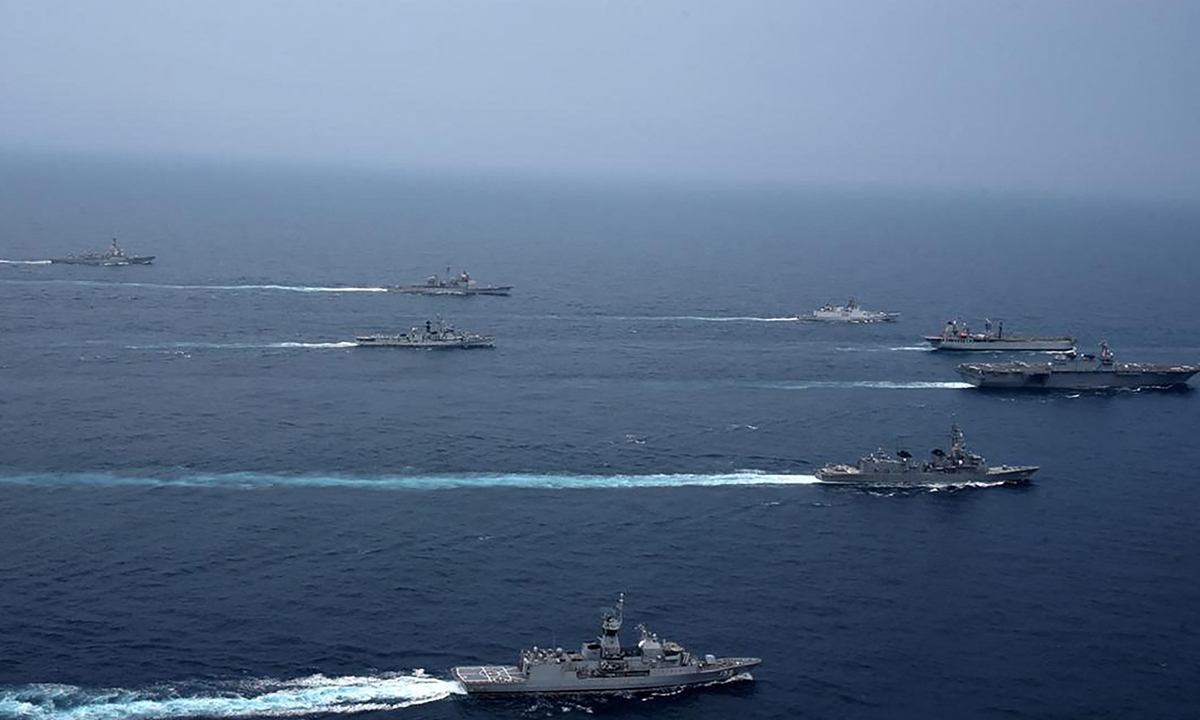
This handout photo released by the Indian Navy on October 12, 2020 shows ships during the second phase of the Malabar naval exercise in which India, Australia, Japan and the US are taking part in the Bay of Bengal in the Indian Ocean. Photo: VCG
Japanese Defense Minister Nobuo Kishi is planning to visit the US in early May for talks with his US counterpart Lloyd Austin on enhancing bilateral ties amid the ongoing tensions in the wake of the Ukraine crisis, as well as "an increasingly assertive China," Kyodo News reported on Thursday citing sources familiar with the matter.
Experts said Japan's aim could be taking advantage of the Ukraine crisis to boost its military power, a rare opportunity that has faced opposition previously. Such a move could be heading toward a dangerous direction, not only disrupting peace and stability in the surrounding regions, including the Indo-Pacific, but messing up the post-pandemic recovery in relevant countries.
During the upcoming talks, Kishi and Austin are likely to claim that they "will not tolerate unilateral attempts to change the status quo in East Asia by force, bearing in mind China's stepped-up military, diplomatic and economic pressure on Taiwan," the report said. The report also hyped "concerns" about Russia's military operation in Ukraine could "embolden" China to do the same to the island of Taiwan.
According to the Asahi Shimbun, Japan's National Security Strategy, to be signed by the end of 2022, could be another topic on Kishi's agenda for the first visit to the US since he took office in October 2021.
Da Zhigang, Director of the Institute of Northeast Asian Studies at the Heilongjiang Provincial Academy of Social Sciences, told the Global Times on Thursday that the two sides will likely discuss the "security threats" that Japan faces as its ties with Russia continue to deteriorate.
"Japan's stance on the Russia-Ukraine conflict has been clear, sanctioning and condemning Russia, expelling diplomats, etc. Its worsening relationship with Russia has clouded the northern territorial dispute between the two sides, and Japan would like the US to help it enhance its defense capabilities in the region," Da said.
Japan has spared no efforts in hyping up the mainland's "threat" to the island of Taiwan and the meeting between the two defense ministers could involve the discussion of specific support measures such as economic and military cooperation.
Hyping up China and Russia's threats has given Japan a very rare opportunity. By taking advantage of the tense situation in Ukraine, it can now develop its own military power and expand its ambitions with a "fair" reason. However, this has been previously met with a strong resistance from the public and political parties, Da noted.
It also gives Japan the opportunity to preempt any threats to its surrounding regions, the Korean Peninsula, the South China Sea, and the Asia-Pacific region.
Calls are growing within Japan's ruling party to discuss a nuclear cooperation arrangement with the US, a contentious issue for a country that has vowed not to maintain or introduce nuclear weapons, the Nikkei Asia reported in March.
With the worsening ties between China and the US, Japan is even expecting further relaxations on the nuclear issue, experts said.
They warned that such a move could be heading toward a very dangerous direction, not only posing huge risks to the peace and stability in these regions, but complicating even more the already hard economic recovery in the post-pandemic in relevant countries.
Aiming to deepen defense cooperation, the US and Japan held a virtual 2+2 meeting in January, with the signature of a new five-year agreement on sharing the cost of US military presence in Japan.
The meeting involved foreign and defense ministers from both countries and, as usual, targeted China which was described as undermining the rules-based international order, and posing "present political, economic, military, and technological challenges to the region and the world."




